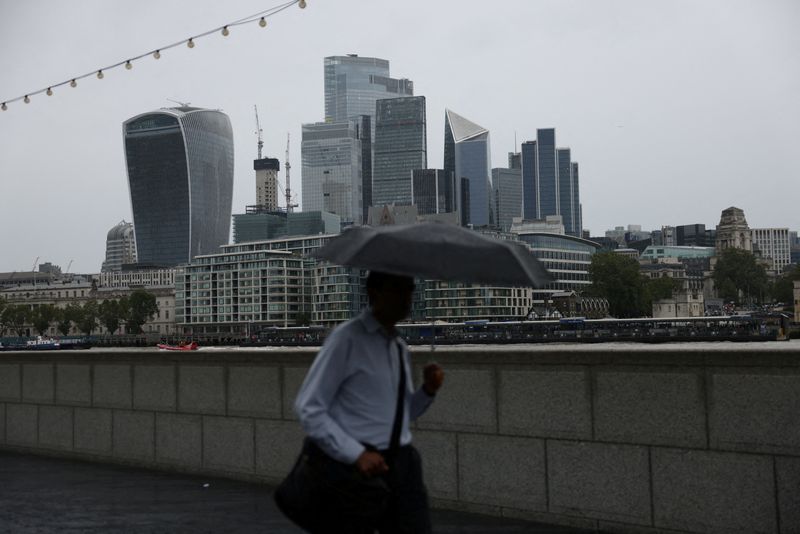By Sinead Cruise, Iain Withers and Lawrence White
LONDON (Reuters) - A mix of global economic unease and geopolitical uncertainty means optimism is in short supply among bankers from the City of London to Frankfurt's 'Mainhattan' financial district.
Even rainmakers renowned for seemingly conjuring deals from nowhere are struggling to see ways to work their magic and drag investment banking revenues out of the doldrums.
Finance executives, consultants and headhunters interviewed by Reuters predict subdued deal flows, modest bonuses for most and heavy job cuts in 2024.
"2023 will ultimately be one of the lowest corporate finance fee pools in modern history," said Fabrizio Campelli, head of Corporate Bank and Investment Bank at Deutsche Bank.
The $2,669 billion of deals struck so far this year globally is the lowest since 2005, Dealogic data shows, while in the Europe, Middle East and Africa region, the $616 billion of deals which have been completed is the lowest since 2004.
It is not only corporate dealmaking that is on the back foot. Banks are wary profits will come under pressure from tighter regulation, including tougher capital requirements dubbed the 'Basel Endgame' which are set to be rolled out by global regulators from 2025.
And while consumer lending has boomed on the back of central bank policy moves, margins are now in retreat as interest rates peak and competition for deposits intensifies.
"Overall, the outlook for the next few years for banks is flat revenue," said Ronan O'Kelly, partner and head of corporate and institutional banking for Europe at consultant Oliver Wyman.
JOB CUTS
Banks have already turned to cost cuts to try to weather the downturn, which in a people-intensive business means job losses.
Global growth is set to fall from 2.9% this year to 2.7% in 2024 before picking up in 2025, the Organisation for Economic Cooperation and Development said on Wednesday.
"Cost (cutting) is the biggest single lever that banks can pull to bring returns to where they should be," O'Kelly said.
Barclays is weighing cutting up to 2,000 back-office jobs in addition to layoffs across its UK retail, corporate and investment bank, Reuters reported, while rival Lloyds (LON:LLOY) has put 2,500 jobs at risk. Challenger Metro Bank said it could axe as many as 1 in 5 jobs.
Major headcount contractions are also expected at UBS and Citi amid big restructurings.
Workers' unions, however, say banks are overstating their problems after some reported record profits this year.
Dominic Hook, national officer at Britain's Unite, said he was fed up with them "pleading poverty".
"The short-term approach of slashing workers, offshoring and outsourcing services has been shown to fail everyone from local communities to small businesses," he said.
BONUSES
The dearth of activity means bonuses for this year are likely to disappoint, although some banks may be more generous to retain talent in case of a sharp rebound, with Goldman Sachs among those weighing hikes despite a dismal 2023.
"At relatively quiet times like these, it is still important to have the best people who are ready for when the market picks up again," said Vis Raghavan, CEO of EMEA and Co-Head of Global Investment Banking, JP Morgan.
Morgan McKinley's London Employment Monitor showed a 31% fall in financial services vacancies year-on-year in the third quarter, although some 52% of UK financial firms still plan to hire in the next six months.
One of those predicting an uptick in business in 2024 is Stephane Rambosson, co-founder of headhunter Vici Advisory.
"Activity should be up next year, so if you don't pay your best people you risk losing them," Rambosson said.
In order to reward the bankers who do remain, Deutsche Bank CEO Christian Sewing has called on the European Union to consider following Britain's lead by removing caps on variable compensation.
Santander (BME:SAN) Chair Ana Botin told an event this week such reforms would help banks to better align staff remuneration with shareholder returns.
VOLATILITY
Wars in Ukraine and the Middle East and tensions between the West and China have led to caution in boardrooms, slowing investment and dealmaking, while putting all but the most pressing refinancings on the back burner.
"It's not a terrible time to be a banker but you can't keep everyone busy and as productive throughout the cycle," said JP Morgan's Raghavan.
"That said, there's $6 trillion in debt that needs to be refinanced over the next two years and banks will be doing that work but that is just flow, and the alpha is not in the flow," he added, with reference to "alpha", how banks measure their money-making advantage over competitors.
Looming elections in the United States, India and Britain next year are compounding the ongoing corporate inertia.
And while London, Europe's leading finance hub according to the Global Financial Centres Index, is part way through reforms to boost its competitiveness after Brexit, recent political ructions have done lasting damage, several bankers said.
Although uncertainty can stymie activity, it can also lead to market volatility that can boost trading teams, which could provide a welcome lift for banks in 2024.
"Volatility in the wider world... can benefit the (trading) business in terms of client demand, risk spreads - so that can be good for the business," said Oliver Wyman's O'Kelly.
And although some bankers expect a tough 2024, others sense an opportunity for European banks from the Basel Endgame.
U.S. banks could be forced to release $15-20 billion in revenues that could be snapped up by rivals, according to an analysis by Oliver Wyman, with around half of those expected to be captured by other international banks.

So what is the forecast from the rainmakers?
"While the market has been slow, it's not without promise. It's like a spring you're pushing down ... when it pops up, it tends to do so with a lot of energy," Deutsche's Campelli said.